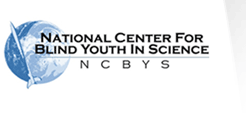Make a Gift to the NFB Jernigan Institute Contact Us Site Map
Career Resources
Career Literature - The NFB has a wealth of literature regarding careers available through their Independence Market. Please visit this page for the list and ordering information.
NFB Training Centers - In order to be fully independent a blind person must really learn and be competent in the alternative techniques of blindness. In addition to these skills, the NFB training centers foucs on instilling a positive attitude and empowering the blind individual.
Careers and the Law
Americans with Disabilities Act (ADA) - This is the official government site dealing with the ADA, specifically in employment.
Articles and Research
Blind medical student earns M.D.
MSNBC
Abstract: Tim Cordes graduated as valedictorian from the University of Notre Dame. After being rejected by several medical schools, the University of Wisconsin at Madison accepted him. Tim is blind and graduated medical school in 2005. This article speaks about his time as an undergraduate and a graduate student.
Blind Students Excel at NASA
Braille Monitor
October 2005
Author: Stacy Cervenka
Abstract: The Excellence through Challenging Exploration and Leadership (EXCEL) program was started in the summer of 2005. Through EXCEL six blind graduating high school seniors and college freshmen had the opportunity to intern for five weeks at the Goddard Space Flight Center in Greenbelt, Maryland, or the Jet Propulsion Lab in Pasadena, California. As prerequisite training for the internship the EXCEL students attended the annual convention of the National Federation of the Blind in Louisville, Kentucky. Throughout the internship program students had the opportunity to observe the work of NASA firsthand and also to get to know other blind students, blind adults, and people working in their chosen career fields, both blind and sighted.
Not Just Taking Up Space: Almost-Infinite Job Possibilities at NASA
AFB Access World
January 2004, Volume 5, Number 1
Author: Deborah Kendrick
Abstract: Smith, a business-information major who has been totally blind since childhood, was offered a ten-week internship in summer 2001 at NASA's Goddard Space Flight Center (GSFC) in Greenbelt, Maryland. One interest that clearly emerged in her assigned tasks there was in the area of Web site accessibility. Upon her 2002 graduation from Mississippi State, she was offered a full-time position with Goddard as a full-time Web accessibility coordinator.
Science Is Golden: Interviews with Four Scientists Who Are Visually Impaired
AFB Access World
January 2005, Volume 6, Number 1
Author: Janet Ingber
Abstract: Thanks to advances in assistive technology, jobs that were once virtually impossible to obtain are now a reality for people who are visually impaired. Careers in science are now within reach. People who are visually impaired have become successful in many scientific fields, including engineering, physics, oceanography, chemistry, and astrophysics.
Food for Thought: Experience of a Blind Dietitian
Braille Monitor
December 1997
Author: Lynn Mattioli
Abstract: Lynn Mattioli was a 1987 NFB scholarship winner. During the years since that first introduction to the organization, she has moved around the country gathering the necessary academic, professional, and blindness tools to do her lifework. At the 1997 convention she told delegates about her adventures in the past ten years as a clinical dietitian at a 250-bed hospital in South Baltimore.
Transition to Employment and Community Life for Youths with Visual Impairments: Current Status and Future Directions
Journal of Visual Impairment and Blindness
December 2001, Volume 95, Number 12
Author(s): Katherine M. Nagle
Abstract: Outcome data from the 21st Annual Report to Congress and the National Longitudinal Transition Study related to youths with visual impairments indicate that postsecondary education does not translate into increased employment opportunities for these youths. The literature on the best transition practices for students with visual impairments is reviewed, and specific recommendations are made in each area.
Transition to What? Education and Employment Outcomes for Visually Impaired Youths after High School
Journal of Visual Impairment and Blindness
August 2005, Volume 99, Number 8
Author(s): Corinne Kirchner and Brooke Smith
Abstract: This article discusses education and employment outcomes for visually-impaired youths after high school. Statistics on the general public have shown that each higher level of education translates to a higher rate of participation in the labor force and, for those in the labor force, to higher rates of actual employment and of full-time employment. A similar picture emerges from statistics on adults who are visually impaired. Consider, for example, the 1994-1995 National Health Interview Survey-Disability Supplement, which explored employment issues of people with disabilities in unusual depth. It showed that visually impaired working-age adults had higher employment rates at each higher level of education completed.
Overcoming Barriers to Employment: Strategies of Rehabilitation Providers
Journal of Visual Impairment and Blindness
June 2005, Volume 99, Number 6
Author(s): Adele Crudden, William Sansing, and Stacy Butler
Abstract: Focus groups of rehabilitation providers identified barriers to the employment of persons who are visually impaired and strategies to overcome them. The barriers included negative attitudes of employers and of persons with visual impairments, inadequate transportation, the lack of access to print, and administrative issues. Strategies for overcoming each barrier are discussed.

